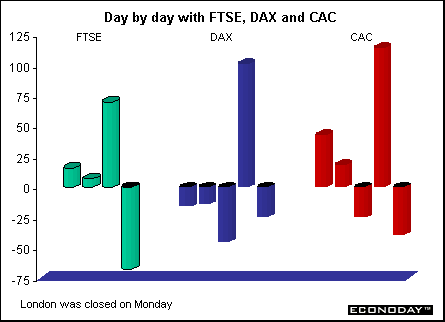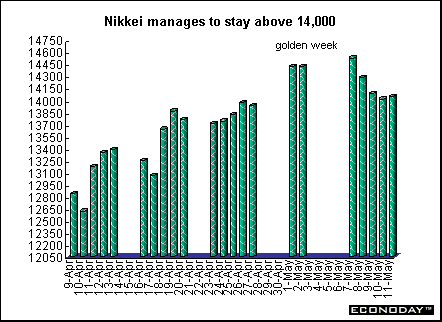
Britain and Europe
The simultaneous lowering of interest rates by the ECB and Bank of England had a positive impact on equities markets Thursday. But on Friday, the "good news is bad news" syndrome struck investors. Equities declined because U.S. economic data seemed too positive and market players worried about how this might impact the Fed's interest rate decision on Tuesday and beyond.

The Bank of England's action caused few market shocks, but the ECB's cut triggered a burst of enthusiastic buying of both British and European stocks on Thursday. But it was back to the wobblies on Friday as investors took profits. The FTSE disappointed again, failing to break the key 6,000 mark last seen on March 8.
Profit taking weighed upon the Paris CAC and Frankfurt DAX as well on Friday, as investors squared positions ahead of the weekend and mulled over the significance of the ECB's surprise interest rate cut. Weakness in the euro and unexpectedly high consumer price data from a number of EMU countries, including Germany and France, also limited any upside.
Asia
Japan's stock indexes rallied to their best levels this year as Prime Minister Junichiro Koizumi said he plans to halt all borrowing except to repay old debts, suggesting that he would reduce government interference in the economy. But after rallying Monday, reality set in and the Nikkei began to sink steadily. Earnings worried investors as the planned bank bailout seemed to be put back until September at the earliest because of the upcoming July elections.

The Nikkei inched up Friday on the news of the ECB's 25 basis point rate cut. This allayed concerns that the EMU economies would shrink and crimp demand for Japanese goods. Japan exports 16 percent of its goods to Europe.


Introduction • Global Stock Market Indexes • Recap of Global Markets • Currencies • Indicator Scoreboard

The Bottom Line • Looking Ahead
|